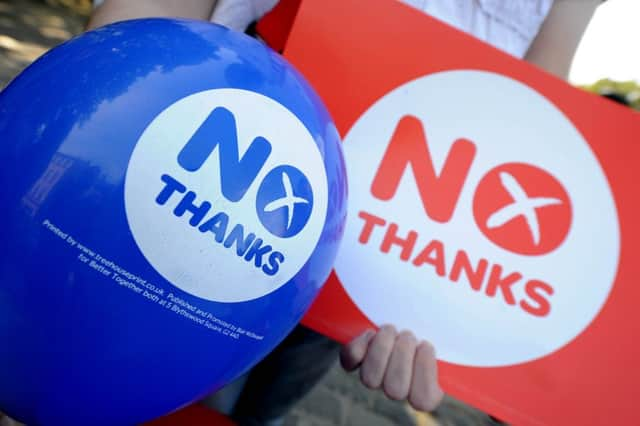‘Unusual alliance’ of voters secured indyref No vote


A breakdown of voting patterns, drawn from a survey of 5,000 Scots conducted soon after the referendum day, found that there was not a clear split between older and young voters.
The Scottish Referendum Study found women were decisive in the result.
Advertisement
Hide AdAdvertisement
Hide AdWhile men were 53 per cent for Yes, women were 57 per cent for No.
Voters earning more than £30,000 were found to be evenly split, while those earning less than £20,000 were 53 per cent for independence, it was also found.
However, it was those earning between £20,000 and £30,000 who can also be seen as deciding the outcome - voting No by a margin of 56 per cent to 44 per cent.
The research found that older voters were strongly in favour of Scotland remaining part of the UK, including 67 per cent of those aged over 70.
But the academics behind the Scottish Referendum Study note that the youngest voters, aged between 16 and 24, appear to have voted No as well.
Those aged 25 to 29 were in the age group most likely to vote Yes, with 62 per cent for independence, yet teenagers and those in their early twenties were 54 per cent in favour of the Union.
However, the analysis does not offer any explanation for why younger age groups split that way.
The survey looked for correlation between voters’ identities and the way they cast their referendum ballot.
Advertisement
Hide AdAdvertisement
Hide AdIt found none on education grounds, when looking at those with and without university degrees.
However, it found a strong link on religious affiliation. Some 60 per cent of Protestants voted No, while 58 per cent of Catholics voted Yes.
Those adherents of the Church of England were 81 per cent for the Union - the strongest correlation of all. However, the research does not indicate that religion was a cause of the way people voted.
It found a weaker correlation between home owner occupiers and a No vote.
Those born in other parts of the UK were much more likely to vote No, by 70 per cent to 30 per cent. There was a smaller No majority for those born outside the UK, and those born in Scotland were evenly split.
The findings of the Scottish Referendum Study are broadly in line with two polls carried out at the time of the referendum.
Though with smaller samples and less detail, these showed a similar gender gap, an indication that the youngest voters were pro-Union, and a split between higher skilled, higher earners and those on lower pay with lower skill levels.
In an extension of the research, a briefing paper from the Scottish Referendum Study shows the issues that had most impact on voters in the latter weeks of the campaign.
Advertisement
Hide AdAdvertisement
Hide AdThe arguments that worked best for the unionist side were that new powers could be secured for Holyrood, short of independence, and that Scotland was already seen as having a fair share of resources or powers.
On the other side, the independence campaign was winning people over with the potential for tackling inequality and the possibility of avoiding budget cuts, the study found.
Academics involved in the study included Richard Wyn Jones, director of the Wales Governance Centre at Cardiff University and David Sanders, regius professor of political science pro-vice-chancellor for research at the University of Essex.